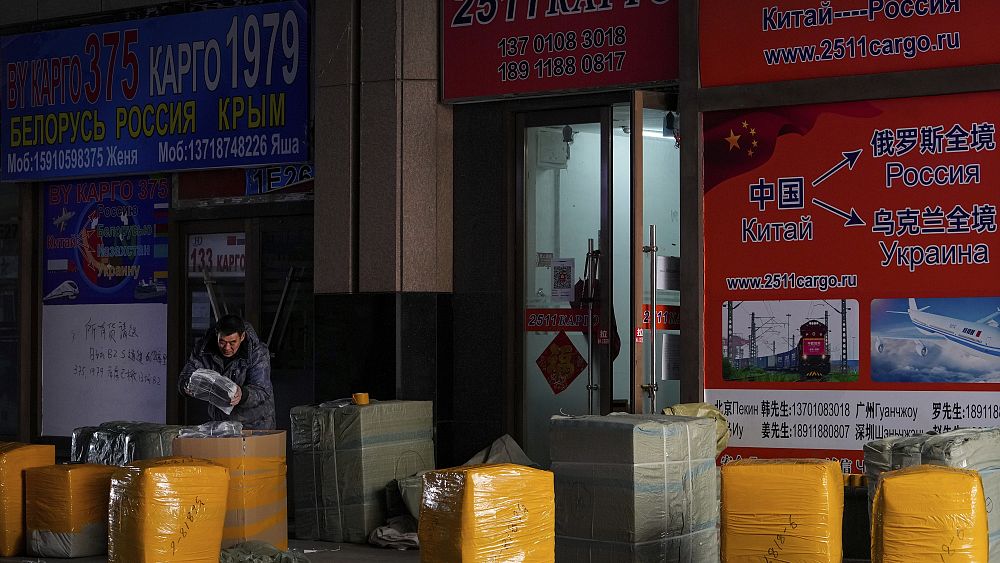
The European Union has announced an 11th round of sanctions against Russia. This time, though, they are mainly aimed at companies based in other states which Brussels believes are being used to circumvent earlier measures.
Over the past few months, there has been a marked increase in imports of Western goods to countries bordering Russia. It is assumed that these cargoes then go into Russia. In addition, transit through Russian territory has also been seriously curtailed, so as not to “accidentally” lose the goods on the way.
According to economic analysts, the very fact that sanctions already have to be imposed on third countries shows that the original restrictions are not working as intended and that Russia is quite successful in finding workarounds.
But how effective they really are is hard to quantify. According to Alexandra Prokopenko of the Berlin Centre for East European and International Studies, the situation is unprecedented.
“We are witnessing a kind of economic experiment that has never happened before. Because no country has ever been under so many sanctions. There are now more than 13,000 completely different sanctions against Russia. That is more than the sanctions imposed on Iran, Syria, North Korea, and Cuba combined,” Prokopenko said.
Meanwhile, Europe is trying to ensure companies understand how the sanctions are being circumvented and act accordingly.
The Secretary General of the Norwegian Helsinki Committee, a human rights NGO, gave a theoretical example of what can happen.
“Some companies are probably violating the sanctions unwittingly. I mean, they have an order of ball bearings going to Kazakhstan and they’re completely happy to export ball bearings to Kazakhstan, not knowing that those ball bearings are going directly to Russia and helping the machinery of the Russian war,” Berit Lindeman said.
Is Russia’s economy sustainable?
Most economists note that the short-term effect of the sanctions was not as serious as was first expected. The Russian economy shrank by just -2.1 per cent last year, and the International Monetary Fund even forecasts a modest growth of 0.7 per cent in 2023.
Energy played an important role in this: the volume of Russian exports fell steadily in 2022, but prices rose even faster, so that in the end, according to the Russian Central Bank, the Kremlin made even more money on gas sales to Europe in 2022 than in 2021.
But now the process of “disconnecting” Europe from Russia is mostly over. According to the European Commission, in February 2023, revenues from the export of Russian oil were 41.7 per cent less than in February 2022.
“Of course, a war in itself can actually boost the economy. So on a level, one might be tricked by figures, by believing that there is a lot of activity in the economy, but much of it is actually related to the war activity itself,” Berit Lindeman explained.
Through the same third-country routes, according to Western data, Russia managed to compensate at best a quarter of the goods hit by the sanctions, and according to some estimates, only 10 per cent. If the fight against the circumvention of the sanctions proves successful, Russia will be weakened far more.
“The problem is that the military-industrial complex in Russia has never been able to convert its know-how into some civilian areas. This means that the imbalance will grow and a “bubble” will inflate around the military-industrial complex,” Alexandra Prokopenko predicts.
“Everything will ‘shrink’ in civilian areas because all the resources will flow into the military sector. This has nothing to do with normal growth. Therefore, in the short term, the sanctions have failed, as they are called, to bring down such a beast as the Russian economy. But in the long term, it is deeply ill.”
China’s role
The EU sanctions list includes companies from China which is already adding to already existing tensions between Europe and China, but could further down the road lead to conflict? This is far less likely than with US-Chinese relations because Europe’s economies are so closely intertwined with China’s.
Could this lead to worsening tensions between Europe and China? Yes, almost certainly it already has. Beijing is an ally of Russia, but it won’t supply arms to Moscow, not blatantly anyway.
“Not only Europe but also the United States can’t do anything about the fact that the level of trade between Russia and China is so high that it is quite easy to hide any sanctions violations in this volume,” Prokopenko said.
Whilst it would be deeply unprofitable for Europe to fall out with China completely, a war is nevertheless being waged on the continent.
“We are at war, and China needs to understand that European security is at stake and it is not helpful that Chinese companies are helping circumvent the sanctions that we have introduced,” Berit Lindeman said.
At some point, China needs to decide whether it wants to be on the side of Europe or on the side of Putin,” she added.
Global South
Along with the “pivot to the East” – to China – Moscow speaks about the “pivot to the South,” to strengthen ties with the countries of Asia, Africa and Latin America.
Undoubtedly, the poor countries of the South cannot act economically as fully-fledged substitutes for the West. But their very position – their refusal to condemn the Kremlin politically and to join economic sanctions – remains an important factor.
And the West may have to extend anti-Russian sanctions to an increasing number of third countries that are already openly critical of US and EU actions – and they tend to be in the South.





